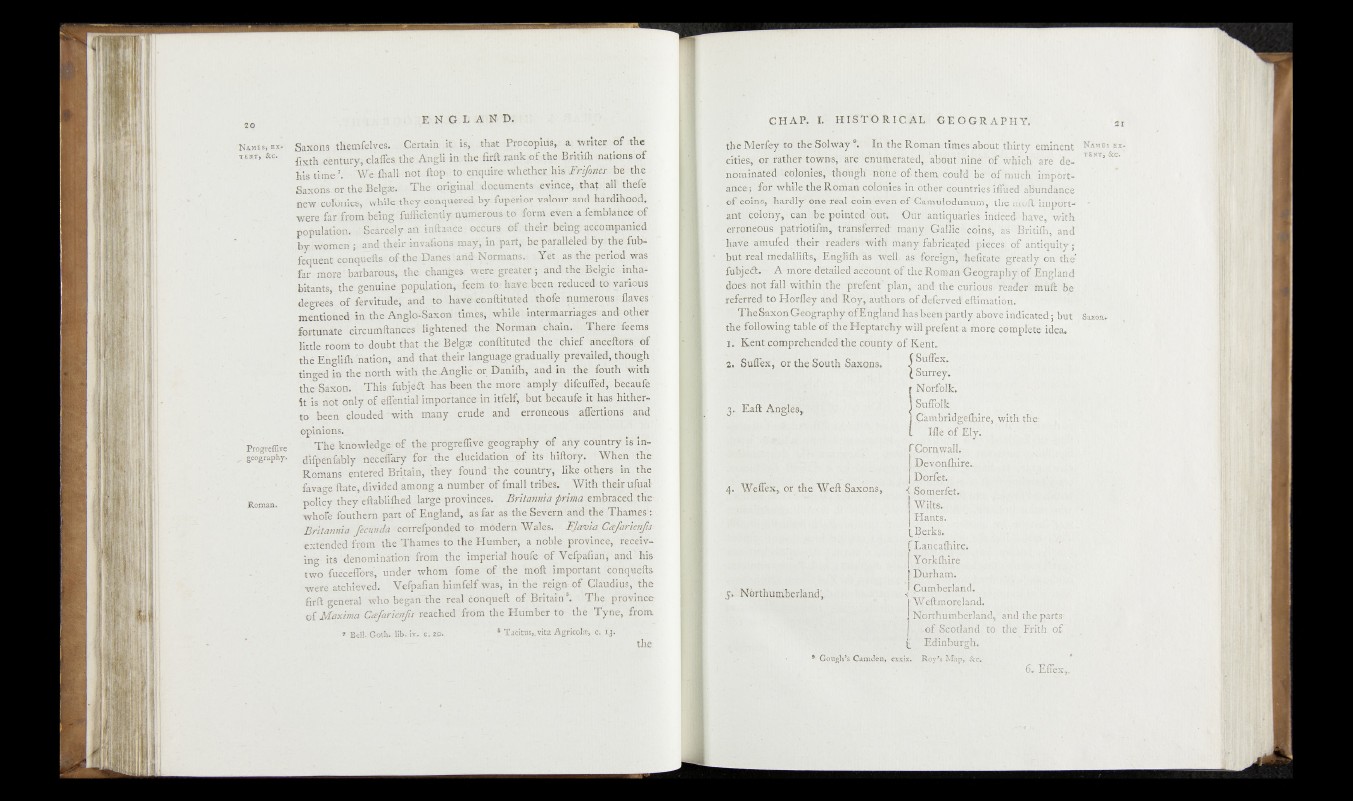
N am e s ; e x ?
TE S T J &Ç.
Progréflive
geography?
Roman.
S a lo n s thenrfdvqA C&fcaih ,ït, ‘M that Procopius^ a, writer o f the
fixth century, claffes the Angli in the firft rank of-the Britifh nations of
his tim e 7. We {hall not flop to. enquire whether his. Frifones., be the
Saxons or th e Belg®. T h e original documents ievince, that all thefe
new colonies, while they conquered by fuperior valour and hardihood,
were far from being fuiliciently numerous to form even a.femblancc of
population. Scarcely an inftance occurs o f their being accompanied
b y women ; and their invasions may, in part, be paralleled by the fub-
fequent conquefts of the Danes! and Normans!' Yet as the period was
far more barbarous, the changes were gre a te r; and the Belgic inhabitants,
the genuine population, Teem tor have: been re'dueedYö: various
degrees o f fervitude, a n d ;# . havö>ÊOnftitutbd tftofe;-numerous* flavêi
mentioned i n tho A n g f o - ^ r a ï t im h s f w |i ^ .n t e h m am a |p * an d o th ^
fortunate eirctrmftances' lightened: the -Nohman ‘cham... There' feems
Kttle room to ’doubt that the België oMftitutedf* t |® h i e f 'afeÉIfors. of
the Englilh.nation, and that.th e ird a n g u a g e ^ d u ^ .p rg y ó ü e d jl^ ^ d g h
fing&d in th e north with the,Angiie o r Baniflq and ‘in ^ th e ! fo u tffw k h
the Saxon. This fubjJ& Bas h'eénYhe more -amplyftdifoiffed, bèdaufé
i t is not only of effential importance in stfdfi? but hesatófe-,i ^ ^ s h i t h f r i
to been clouded w ith many crude andr C erroUeoWi^hfertionö and
opinions._ ■
■ The know led ge^ the>pr^é.ffiv%",gfedg$,ip i;y b f!a h y^ c^ try ;ïs-ih -
difpénfably necefihry elucidation p f | f e r' hiflp%ï W h en ^ th è
Romans entered Britain, they found' the country, like others in the
favage-ftatê, divided among a number of final! tribes. W ith their ufual-
policy they eftabliftied large provinces. Britannia prima embraced the
whofe fbuthern part of England, as far as the Severn'and?t^#^Pffamesi:
Britannia fecunda correfponded to modern Wales, FJavia Ccefarienjh
extended from, the Thames to the Humber, a noble province, receiv-
ing its denomination from the imperial’ houfe of Vefpa-fian:, and his
two fueceffors, under w hom fome of the moft important; conquefts
■were atchieved. Yefpafian himfelf was, in the rejgri.- of Claudius, the
firft general who began the real conqueft of Britain". The province
o f Maxima Cafarierifis reached from the Humber to the T yne , from.
i- Bell.’ G o th - lib . iv. c. z'0. . " * Tacitus,,vita Agricolic, e\ 13.
I tlie
the Merfey to the Solway9. In the R oman times about thirty eminent
cities, or rather towns, are enumerated,. about nine of which' are denominated
colonies, though Tib fie of* them could be of much importance
; for while the Roman coloiiies in other countries iffued' abundance
of coins, hardly one real coin even of Gamulodunum, the moft import-*
ant colony, can he pointed out. Our>.antiquaries .indeed- have, with,
erroneous patriotifm, transferred many Gallic eoitis, as Britifh, and'
have amufed their readers with many fabricated pieces of antiquity -
but real medallifts, Englilh as well, as foreign,' hefitate greatly on the:
fuhjeft. A more detailed aecbnnt of the Roman Geograp'byof England
does;not fall within the prefent' plan, and the curious: reader muft be
referred to Horftey and Roy, authors of deferved eftimation.
The Saxon Geography o f England has been partly above indicated; hut
the following.?table,b'f th e Heptarchy will prefent a More complete idea,
’■il K ent comprehendedftne^'cdunty'oRKeift^1'
a. Suffex, o r the South Saxons.
3.. Eaft Angles^'
4. Weffex^ o r ^ e 'ViTeft Saxhns,
.S'. Northumberland^.
Suffex. ’ ■
[Sutreyi !b
NoïfolÈ.
Cambridgelhire, with- the?. , ■
r I fie g u f f s
I f J jp m w a l l .
Dev.o.nihirn.«,
B.DorfeW' ,,,*
^Sonieif^jt.
H ants!
pBerks. '
rLancafhire,.
I Yorkshire , .
j-Durham.
I Cumberland..
I Weft m brel and.
1 Northumberland, and the parts7
f l •lóf'Scotland to the Frith o f
^ Edinburgh. '
*- Goiigli’ s. Camden, cxxtx-. R o y’ s Mag, &c.
i MEffcx,
N am e s e x tent,
&c. '
Saxons.